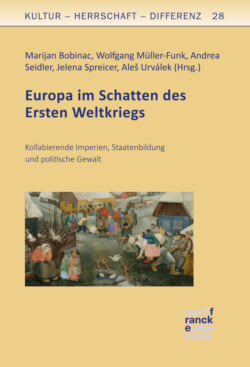Читать книгу Europa im Schatten des Ersten Weltkriegs - Группа авторов - Страница 22
На сайте Литреса книга снята с продажи.
3. Detour or Shortcut
ОглавлениеUnderstanding violence as a shortcut to death1 – which as such obviously repetitively informs all cultural,2 scholarly, and ideological projects – is the only way of getting enabled to attempt introducing any change. In the discussed Freud’s text, the missing links, lacunas as well as footnotes and additions, introduce difference in the linear content of his narrative, hence exact further, for the purpose of reading, our own inscription of meaning by change through repetition which, for example, feminist critics did achieve – rescuing dead Sophie in the rhetoric of their script. In the discussed Akhmatova’s poems, with a stubborn eagerness, the crafting of her lines repetitively resurfaces various manifestations of death, so as for Anna to mirror the – drilled within her bodily self – external, surrounding, and unremitting threats to life. Yet only – and that is where Akhmatova’s poetic and feminine genius lies – to serve, and further procure, the plentiful cathectic level of her aesthetic counteracting the drive-call of death, incessantly reaching out toward a resisting (form of the self-allured) “We”. It is not her (self)repression, but (self)revelation that determines Akhmatova’s repetition: her narrated disclosures involving always the life-versus-death zero-sum game, the strategy for achieving the artistic perfection, yet with such confessing sincerity that it could not but be rewarded Akhmatova’s return from death.
For the repetitiveness of certain content cannot be stopped only by remembrance, by making it conscious to us, or by representation of the repressed event; it is possible only within and with the help of the theoretical concept of transference, although transference itself can again be reduced to repetition – but to the repetition that implies the emotional, bodily, dramatic, or theatrical element of change. It is transference that matters in Freud’s essay Beyond the Pleasure Principle, in Akhmatova’s poetry, and in my reading of them both. As Shoshana Felman says, literature functions in psychoanalysis precisely as its “unthinkable”, as the “condition of possibility and the self-subversive point of the psychoanalytic thought that takes from literature its logic and rhetoric”.3 Therefore, the death drive, exemplified in negations that are for Freud4 the factor of all repetition, is however also the pathos for defining a theory of subject. The later 20th-century (pragmatic, artistic, theoretic) advent of the subject is made possible only by the (internal) split and the projection of the negativity into the Traumatic Thing, which then returns that projection – while diversifying the newly opened domain of gender so as to read out in multiple ways the “labours” of the “I” within “It”. That is how Anna Akhmatova’s poetry narratively and rhetorically constitutes itself, well in advance of major Western theoretical and literary projects.
The crucial difference between Freud and Akhmatova is in the way they establish their transference – Freud as a detour (through substitution), Akhmatova as a shortcut, which is saying of whether or not the author is capable of confessing the torturing role of an involved witness or a performing “prophet”, as one’s own at least attempt to handle the death drive in person, which Anna did carry through. I will return to the beginning of this presentation, and the quoted Instead of Preface – a magnificent feedback that took place in reality between two burdened women, who were waiting for many months in front of the Leningrad prison to hear of their dear ones: one unknown woman who gives a prompt, the other a famed poetess who gives a promise. Equally authorizing both women to the witnessing function, Akhmatova repeats the trace of life on what has already been erased by death. As if through all the years of crafting her “witnessing poetry”, Anna was moving to the point of writing this, even if retrospectively, or precisely because of that. The embodied enactment of the incorporated transference as an internally dialogized split is only what makes possible the overcoming of the split – as repetitively witnessing to a face as life: the claim of literature itself.
